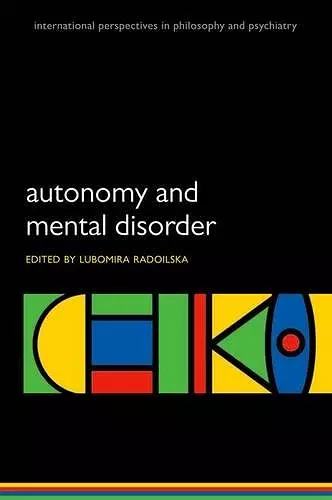Autonomy and Mental Disorder
Format:Paperback
Publisher:Oxford University Press
Published:19th Apr '12
Currently unavailable, and unfortunately no date known when it will be back

Autonomy is a fundamental though contested concept. For instance, most of us place great value on the opportunity to make our own decisions and to be able to lead a life of our own choosing. Yet there is stark disagreement on what is involved in being able to decide autonomously, as well as how important this is compared with other commitments. For example, the success of every group project requires that group members make decisions about the project collectively rather than each on their own. This disagreement notwithstanding, mental disorder is routinely assumed to put a strain on autonomy. However, it is unclear whether this is effectively the case and, if so, whether this is due to the nature of mental disorder or of the social stigma that is often attached to it. Autonomy and Mental Disorder is the first exploration of the nature and value of autonomy with reference to mental disorder. By reflecting on instances of mental disorder where autonomy is apparently compromised, it offers a systematic discussion of the underlying presuppositions of the present autonomy debates. In so doing, it helps address different kinds of emerging scepticism questioning either the appeal of autonomy as a concept or its relevance to specific areas of normative ethics, including psychiatric ethics. Written by leading figures in philosophy and psychiatry, Autonomy and Mental Disorder will appeal to a wide range of readers in these and related disciplines. Lubomira Radoilska is Affiliated Lecturer in the Faculty of Philosophy at Cambridge University and Research Associate of the Uehiro Centre for Practical Ethics at Oxford University. She is the author of Aristotle and the Moral Philosophy of Today (2007).
Overall, ^i Autonomy and Mental Disorder^r is a valuable read and provides an interesting insight into some key areas of the philosophical debate around this topic. This book would be of interest to anyone involved with mental healthcare, mental health law or medical ethics who wants to expand their understanding of autonomy from a philosophical perspective. * Gregory Shields, Journal of Mental Health *
The various chapters raise many interesting questions and collect many different perspectives on autonomy in mental health care. That makes it a valuable collection for students and professionals in this line of work who want to gather insights on problems concerning autonomy. * Philosophy in Review *
This is a rich, diverse and engaging collection of essays that would be of immense use researchers and clinicians. * Metapsychology Online Reviews *
Marks a significant intellectual change and this collection of essays, usefully structured by the editor and with a synthetic introduction, makes a very interesting contribution. * British Journal of Psychiatry *
American psychiatrists will find this book fresh in at least two respects: (1) that it approaches individualistic autonomy from a questioning rather than an idealizing stance and (2) that it departs somewhat from the usual competency/capacity forensic focus that orthodox medical education tends to take on the subject... Whilst this text is digestible enough to be read cover to cover, its contents are not iterative; readers can easily pick and choose the chapters that seem most germane to their practices and curiosities. Regardless, they will find valuable investigations into what it means to be autonomous and what it means to be respectful of others' autonomy. * Journal of Clinical Psychiatry, May 2013 *
ISBN: 9780199595426
Dimensions: 234mm x 155mm x 19mm
Weight: 506g
328 pages